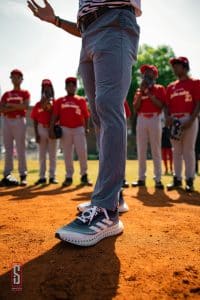 I was recently in Jamaica for a vacation with my wife and two daughters. I was able to work out and read every day. I also was able to swim in the pool and/or the ocean every day.
I was recently in Jamaica for a vacation with my wife and two daughters. I was able to work out and read every day. I also was able to swim in the pool and/or the ocean every day.
As a child, I learned how to swim at the Adams Park Summer Camp byway of Atlanta Parks and Recreation. As an adult, I have not had much time to swim, but swimming in Jamaica made me feel like a kid again.
I have never used a float device until Jamaica. I had to laugh at myself because I have a hard time trusting people, and there I was trusting this float to keep me up. The float was longer than my 6-foot 2-inch body, but it couldn’t have weighed less than 5 pounds.
I saw other people floating, but I was trying to figure out how this thing was going to hold up my 235 pound body.
I finally got relaxed and I was able to enjoy it for over 15 minutes until my ADHD took over and I needed to do something more stimulating.
But while I was floating, I began to think about coaching. Coaches can be the ones who help a player get from one place to the other. Yet, there are some players who have too much weight for any float or coach to handle.
I have been coaching professionally for more than 25 years. I am a thought leader when it comes to sports-based youth development (SBYD), which is a theory and practice model for direct youth service.
According to CASEL, Social Emotional Learning (SEL) is the process by which all young people and adults acquire and apply the knowledge, skills and attitudes to develop healthy identities, manage emotions and achieve personal and collective goals, feel and show empathy for others, establish and maintain supportive relationships, and make responsible and caring decisions.
Some of the SEL capacities people need in order to live a good life as a citizen, but definitely required to be an elite baseball player include:
- Contribution
- Goal orientation
- Positive identity
- Self-confidence
- Self-efficacy
- Self-management
- Social capital
- Social connections
- Social skills
I have coached hundreds of baseball players. Lots of them begin lacking most and sometimes all of these SEL capacities.
Angela Duckworth said it best, “Mindlessly ‘going through the motions’ without improvement can be its own form of suffering.”
Like trying to win at the game of life, baseball is a complex sport that requires strategy and skill. I define talent as what you do well, while skills are what you do well repeatedly without thought while under stress.
May God bless those who cannot learn, unlearn and relearn because in the age of artificial intelligence (AI), the unskilled will suffer.
How good do you want to be in baseball? What support do you need that you don’t have that will help you be the best baseball player you can become?
Do you have mental, emotional and/or physical issues that make it difficult for you to be properly coached?
They are important questions to ask.
For more information, visit L.E.A.D. Center for Youth today. Also, check out our Digital Magazine.
C.J. Stewart has built a reputation as one of the leading professional hitting instructors in the country. He is a former professional baseball player in the Chicago Cubs organization and has also served as an associate scout for the Cincinnati Reds. As founder and CEO of Diamond Directors Player Development, C.J. has more than 22 years of player development experience and has built an impressive list of clients, including some of the top young prospects in baseball today. If your desire is to change your game for the better, C.J. Stewart has a proven system of development and a track record of success that can work for you.


